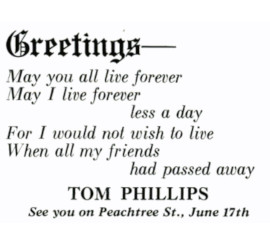A. A. Milne? Winnie the Pooh? Tom Phillips? Walter Kerr? Jack Valenti? Anonymous?

Question for Quote Investigator: The following poignant and memorable quotation about love and companionship appears on many websites:
If you live to be a hundred, I want to live to be a hundred minus one day, so I never have to live without you.
Usually these words are attributed to the author A. A. Milne who created the character Winnie the Pooh and his companions Tigger, Eeyore, Piglet, Christopher Robin and others. Yet, I have never seen a citation, and I suspect that the Milne never wrote it. Would you please explore this topic?
Reply from Quote Investigator: QI has been unable to find this quotation in the writings of A. A. Milne. The earliest conceptual match located by QI appeared in “The Rotarian” magazine in 1917. An advertisement from Tom Phillips presented a four-line verse containing the central idea of the quotation. Boldface added to excerpts by QI:1

Greetings—
May you all live forever
May I live forever less a day
For I would not wish to live
When all my friends had passed awayTOM PHILLIPS
See you on Peachtree St., June 17th
Below are additional selected citations in chronological order.
The first collection of stories about the Winnie the Pooh character appeared in 1926. Milne did write a passage that partially matched the target quotation in the 1928 book “The House at Pooh Corner”. The ages of a hundred years and ninety-nine years were mentioned:2
“Pooh, promise you won’t forget about me, ever. Not even when I’m a hundred.”
Pooh thought for a little.
“How old shall I be then?”
“Ninety-nine.”
Pooh nodded.
“I promise,” he said.
The crucial idea of dying shortly before a beloved companion was not mentioned in the passage, and the difference between the two ages was one year instead of one day.
In 1942 a columnist in the “Valley Morning Star” of Harlingen, Texas described Tom Phillips as the “Sage of Santa Rosa” and stated that he was always engaging in interesting activities that kept his name in the paper. The columnist received a card from Phillips containing a close match of the 1917 quotation:3
We received a Christmas card in the mail from Tom which consisted of a very flattering likeness of his face on the right hand side and the following greeting on the left hand side:
“May you live forever-
May I live forever — less a day.
For I would not care to live
when all my friends had passed away.”
In 1951 a newspaper in Knoxville, Tennessee described an elderly gentleman who delivered a line that partially matched the quotation:4
After pouring a glass of water he toasted the girls
“May you live 1000 years. And may I live 1000 minus one day”
Then he put his ever present cigar back in his mouth and walked away.
In 1968 the theater critic Walter Kerr used the phrase “forever less a day or two” when he referred to a performer with long history of acting:5
. . . Kenneth Nelson, who’s been roaming the road forever less a day or two . . .
In 1999 a columnist in Mount Carmel, Illinois attributed an exact match for the quotation to Winnie the Pooh:6
If you live to be a hundred,
I want to live to be a
hundred minus one day,
so I never have to live without you.
— Winnie the Pooh
It is possible that some book or movie featuring Winnie the Pooh produced by the Disney corporation instead of A. A. Milne included this statement, but QI has not yet identified this product.
In 2000 the phrase “forever, less a day” was attributed within a “Boston Globe” newspaper editorial to Jack Valenti who was the longtime president of the Motion Picture Association of America. Valenti favored maximizing the duration of copyrights:7
Valenti has little to say about this law, although he is mentioned in the Congressional Record as favoring a further extension to “forever, less a day.” Even a mere 95 years is far more than the “limited time” established by the Constitution.
In 2008 “The Complete Idiot’s Guide to Great Quotes for All Occasions” printed the quotation together with a pointer to a book by Milne, but QI has searched that text without finding the quotation:8
If you live to be a hundred, I want to live to be a hundred minus one day, so I never have to live without you.
—A. A. Milne, Winnie the Pooh, 1926
In conclusion, currently there is no substantive evidence that A. A. Milne employed this quotation. Tom Phillips should receive credit for the 1917 verse which expressed a similar idea.
Image Notes: Illustration of the infinity symbol composed of heart symbols from GDJ at Pixabay.
Acknowledgement: Great thanks to quotation expert Nigel Rees who mentioned this quotation in his “‘Quote…Unquote’ Newsletter” of January 2020. Rees highlighted the lack of evidence that A. A. Milne wrote the quotation, but he also noted that the passage mentioning a hundred years and ninety-nine years did appear in a Winnie the Pooh work.
Update History: On March 30, 2025 the format of the bibliographical notes was updated.
- 1917 January, The Rotarian, Volume 10, Number 1, (Advertisement placed by Tom Phillips), Quote Page 94, Column 1, Rotary International, Chicago, Illinois. (Google Books Full View) link ↩︎
- 1957 Copyright, The World of Pooh: The Complete Winnie-the-Pooh and The House at Pooh Corner by A. A. Milne, Section: The House at Pooh Corner (1928 Copyright), Chapter 10: In Which Christopher Robin and Pooh Come to an Enchanted Place, and We Leave Them There, Start Page 298, Quote Page 313, Dutton Children’s Books, New York. (Verified with scans) ↩︎
- 1942 December 20, Valley Morning Star, Rio Roundup by John L. Stone, Quote Page 4, Column 2, Harlingen, Texas. (Newspapers_com) ↩︎
- 1951 May 16, The Knoxville News-Sentinel, Spry Nashvillian Has Been Active Bank Official 58 Years by Leon Powell, Quote Page 5, Column 2, Knoxville, Tennessee. (Newspapers_com) ↩︎
- 1968 May 26, The New York Times, Section: Arts and Leisure, Come Out, Come Out, Wherever You Are by Walter Kerr, Quote Page D1, Column 4, New York. (ProQuest) ↩︎
- 1999 November 5, Daily Republican-Register, Musing on the Wabash, Quote Page 1, Column 1, Mount Carmel, Illinois. (Newspapers_com) ↩︎
- 2000 October 5, Boston Globe (Third edition), Protecting E-Copyrights, Quote Page A26, Boston, Massachusetts. (ProQuest) ↩︎
- 2008, The Complete Idiot’s Guide to Great Quotes for All Occasions by Elaine Bernstein Partnow, Chapter 1: I Do, I Do, Quote Page 2, Published by Alpha Books: Penguin Group, New York. (Verified with scans) ↩︎